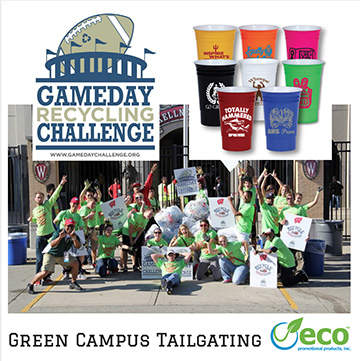Green Your Campus Tailgate with Eco Friendly Products
College football kicks off September 1. The start of football season also means the start of football tailgating parties.
Colleges and universities have made sustainability a priority at football games by making recycling and composting more widely available at stadiums both inside and in parking lots and surrounding areas. The GameDay Challenge is an annual friendly competition for colleges and universities to promote waste reduction at their football games. Participating colleges and universities vie for top spots in two categories: total number of pounds recycled and percentage of waste diverted. The 2015 winners were Louisiana State University with 86,400 pounds recycled and Ohio University with a diversion rate of 95.708%.
The college game day experience often starts with a tailgate party. When planning a tailgate, whether it’s a university sponsored or private tailgate, there are many ways to reduce waste. One of the easiest ways to reduce waste is to ditch disposable plastic and choose reusable cups, plates and utensils. For school sponsored tailgate events, give attendees reusable party cups and reusable utensil sets with your school’s logo on them. Guests can use these products during the tailgate and then take them home as a keepsake. And unlike disposable colored party cups frequently found at tailgates, not only are Eco Promotional Products’ branded party cups reusable, they are also recyclable. In addition to using reusable cups, utensils and serving pieces, purchase food and beverages in bulk to reduce the amount of packaging.
After the event, dispose of your trash and recyclables properly. Penn State University’s Beaver Stadium has an excellent recycling program. Nearly 300 recycling bins are placed throughout the stadium grounds. Additionally, volunteers from student group STATERs (Students Taking Action to Encourage Recycling) hand out nearly 2,000 blue recycling bags encouraging people to bag up recyclables when the tailgate is over.
Waste reduction proves to be more challenging upon entering stadiums. Unfortunately disposable plastic bottles are still widely sold at stadiums and largely end up in the trash.
University of Michigan has the largest football stadium in the country and also prohibits water bottles of any kind. That includes a disposable water bottle that could potentially be reused during the game and then recycled. The student government has petitioned for a change to this policy stating “109,901 is the capacity of the University of Michigan Football Stadium. If 30% of those fans buy plastic water bottles (which is probably a low estimate), that's 32,970 bottles used every game. If there are six home games, that means that over 5658 pounds of empty plastic is created every season just from bottled water.” On the plus side, recycling is available at “The Big House” and fans recycled 2.76 tons of material during last year’s game against Ohio State.
College stadiums can do more than just recycle when it comes to waste reduction at stadiums. Auburn University and University of Florida both make sustainability high priority. Temperatures during early September games at Auburn’s Jordan-Hare Stadium in Alabama are frequently in the 90s. Fans are allowed to bring empty, clear water bottles which can be filled at multiple water stations throughout the stadium. All water stations offer filtered water free of charge. And at the University of Florida every item sold inside the stadium is designated as either compostable or recyclable with appropriate disposal containers located throughout the stadium.



